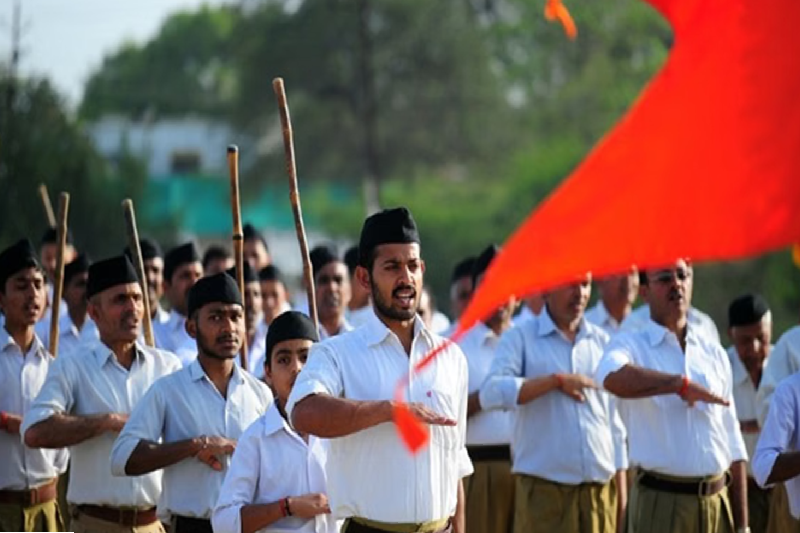
Delhi Schools to Introduce ‘Rashtraneeti’ Curriculum Highlighting RSS and Freedom Fighters
The Delhi government is set to implement a new educational curriculum, Rashtraneeti, in government schools across the city to broaden students’ understanding of civic duties, ethical governance, and national pride. Announced by Education Minister Ashish Sood, the curriculum will cover chapters on the Rashtriya Swayamsevak Sangh (RSS) and notable figures from India’s freedom struggle. Designed for students from Class I to XII, Rashtraneeti will introduce young learners to the nation’s diverse historical, social, and political fabric, highlighting well-known and lesser-known leaders shaping modern India.
Key Features of the Rashtraneeti Curriculum
A significant curriculum highlight is the chapter titled RSS@100, which marks the centenary of the Rashtriya Swayamsevak Sangh. This section traces the organisation’s origins, founding principles, philosophy, and role in India’s development over the last century. It will provide insights into the RSS’s emphasis on discipline, social service, and nation-building, as well as its involvement in initiatives such as blood donation drives, disaster relief during the Kedarnath tragedy, and support during the Covid-19 pandemic.
Minister Ashish Sood defended the inclusion of the RSS, stating, “Introducing students to the history and journey of a century-old organisation is a meaningful way to broaden their understanding of the nation's social and cultural fabric.” He added that the curriculum also incorporates lessons on freedom fighters, enabling students to gain more profound knowledge of India’s historical journey toward independence.
The government confirmed that the basic outline of Rashtraneeti has been launched. The full set of textbooks is under preparation and vetting, with final publication expected in November 2025. Teacher handbooks have already been prepared, and training sessions are underway at SCERT (State Council of Educational Research and Training) to equip educators with the tools and guidance necessary to teach the new content effectively.
Freedom Fighters Spotlight
Rashtraneeti aims to familiarize students with celebrated and lesser-known freedom fighters who contributed to India’s independence. The historical figures included are Veer Savarkar, Subhas Chandra Bose, Shyama Prasad Mukherjee, and Sardar Vallabhbhai Patel. In addition, a special section on Atal Bihari Vajpayee will highlight his contributions and association with RSS.
By integrating stories of diverse leaders, the curriculum seeks to promote civic consciousness and national pride among students while reinforcing lessons on ethical governance and active citizenship. Including these figures is intended to provide a holistic view of India’s socio-political history and the values that guided its leaders.
Civic Education and Active Citizenship
Beyond historical knowledge, Rashtraneeti emphasizes civic duties, governance, and democracy. The curriculum encourages students to understand the role of citizens in a democratic society, highlighting the importance of responsible citizenship, participation in governance, and respect for democratic institutions.
Education experts point out that teaching civic awareness early fosters ethical decision-making, social responsibility, and leadership skills, ensuring that students are better equipped to engage with contemporary societal challenges. Rashtraneeti’s structured approach aims to make these lessons accessible and age-appropriate for learners across all classes. This ensures consistent exposure to governance concepts and civic engagement from primary school through higher secondary levels.
Implementation Across Schools
The Delhi government has confirmed that Rashtraneeti will be implemented in all government schools across the city. Textbooks are scheduled for publication by November 2025, following a vetting period until October 15. Teacher handbooks and SCERT-led training sessions are part of the preparation, allowing educators to guide students effectively through the new material.
Officials have emphasized that this rollout is comprehensive and systematic, covering Classes I to XII to ensure a consistent learning experience. By starting civic education early, the initiative seeks to instill a strong sense of national identity, social responsibility, and historical awareness in students as they progress through school.
Educational and Cultural Significance
Rashtraneeti reflects a broader educational reform strategy in Delhi aimed at integrating history, civic responsibility, and cultural knowledge into the school curriculum. By combining lessons on freedom fighters and the RSS with civic education, the initiative seeks to create well-rounded students aware of their rights, responsibilities, and the historical context of India’s democratic journey.
Education Minister Sood highlighted that the curriculum is extensive and well-structured, designed to provide meaningful learning outcomes while maintaining academic rigor. The initiative underscores the government’s commitment to broadening the perspective of young learners and providing them with tools to engage thoughtfully with society.
Teacher Training and Support
To ensure effective implementation, SCERT conducts training sessions for teachers, equipping them with the necessary guidance to handle new content and engage students effectively. Teacher handbooks have been prepared to facilitate lesson planning and classroom discussions.
The government emphasizes that educators play a central role in translating Rashtraneeti’s objectives into practical learning outcomes. By thoroughly training teachers, Delhi aims to create a supportive educational environment where students can explore historical, cultural, and civic topics in depth.
Looking Ahead
The Rashtraneeti curriculum represents a comprehensive approach to civic and historical education, blending lessons on governance, ethics, national pride, and social service. With its focus on historical leaders and contemporary societal contributions, the initiative is expected to enrich students’ understanding of India’s past, present, and civic responsibilities.
By launching Rashtraneeti across all government schools, Delhi is taking a step toward creating informed, responsible, and engaged citizens. The initiative will help students appreciate the complexity of India’s history, recognize the contributions of its leaders, and understand the importance of active participation in democratic governance.
As textbooks are finalized and teachers receive training, the government expects Rashtraneeti to be fully operational in schools starting in November 2025. It will offer a transformative educational experience that combines history, civic responsibility, and ethical governance in a cohesive curriculum for learners from Class I to XII.


